|
|
|
Sort Order |
|
|
|
Items / Page
|
|
|
|
|
|
|
| Srl | Item |
| 1 |
ID:
068581
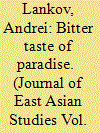

|
|
|
| 2 |
ID:
091462
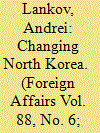

|
|
|
|
|
| Publication |
2009.
|
| Summary/Abstract |
By exposing them to the truth about their impoverishment and about the prosperity of their South Korean cousins, the United States can encourage North Koreans to change the regime in Pyongyang.
|
|
|
|
|
|
|
|
|
|
|
|
|
|
|
|
| 3 |
ID:
109209
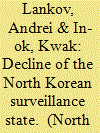

|
|
|
|
|
| Publication |
2011.
|
| Summary/Abstract |
One of the peculiarities of the North Korean system is the cohesive nature of state surveillance. This surveillance operates through two major channels: at his/her job a North Korean is controlled by the "organization," and in his/her place of residence surveillance is done by the "people's group." This article, based on the refugees' testimony and available publications, traces the origin and the types of surveillance used by the "people's groups." Nonpolitical activities of the "people's groups" are discussed as well. Finally, the article traces how the "people's groups" have changed in the last two decades as state control began to disintegrate.
|
|
|
|
|
|
|
|
|
|
|
|
|
|
|
|
| 4 |
ID:
179558
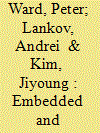

|
|
|
|
|
| Summary/Abstract |
North Korea today is a most unusual post-socialist state. Market actors and market prices are integral to economic life, but private property remains illegal, and private enterprise outside the household is de jure non-existent. In such an institutional context, some market processes are more autonomous in relation to the state, while others are more embedded within state structures. In this article, we offer a theoretical account of the shape that North Korea's market economy has taken, developed from a set of fishing industry case studies. We note four broad categories of enterprises: closely embedded, loosely embedded, semi-autonomous, and autonomous. By relative autonomy/embeddedness we mean control over fixed assets, cash flow, and operational decisions such as wage and price setting. We postulate three major determinants of embeddedness/autonomy: (1) relative strategic resource scarcity between state and market actors, (2) monitoring costs, and (3) institutional evolution that reflects these realities, though to varying extents.
|
|
|
|
|
|
|
|
|
|
|
|
|
|
|
|
| 5 |
ID:
046400


|
|
|
|
|
| Publication |
London, Hurst & Company, 2002.
|
| Description |
xvii, 202p.hbk
|
| Standard Number |
1850655634
|
|
|
|
|
|
|
|
|
|
|
|
Copies: C:1/I:0,R:0,Q:0
Circulation
| Accession# | Call# | Current Location | Status | Policy | Location |
| 046469 | 951.93043/LAN 046469 | Main | On Shelf | General | |
|
|
|
|
| 6 |
ID:
151253
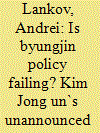

|
|
|
|
|
| Summary/Abstract |
The potential success of North Korea`s policy commonly known as “Byungjin (simultaneous advancement) Line,” is the topic of the present article. Since 2012, the new North Korean leadership has implemented a policy of Byungjin, which implies three major components: cautious market-oriented economic reforms, the development of a full-scale nuclear strike force, and maintenance of very strict surveillance and control systems domestically. It has been argued that the Byungjin policy cannot possibly succeed, but this article demonstrates that, so far, the policy has produced some notable results and delivered a measure of economic growth. This article further argues that the Byungjin policy has the potential of achieving a measure of long-term success, allowing Kim Jong Un and his system to survive for some time, maintaining both political stability and economic growth. It also argues that, given the peculiar international situation of North Korea, and other important variables, including Kim Jong Un`s age, the policy makes perfect sense―if judged from the perspective of the North Korean hereditary ruling elite. This article considers the problems Kim Jong Un`s model of authoritarian developmentalism will face and focuses on both de-stabilizing and stabilizing factors currently at work in North Korea. The article concludes that success of the Byungjin policy is possible, but will lead to a number of new challenges for the outside world.
|
|
|
|
|
|
|
|
|
|
|
|
|
|
|
|
| 7 |
ID:
159180


|
|
|
|
|
| Summary/Abstract |
In the 1990s, a part of the North Korean economy underwent a process of marketization and de facto privatization. While largely spontaneous, this process was eerily reminiscent of developments in other post-Communist countries in Eastern Europe. One of the results was the emergence of a new entrepreneurial class, a nascent bourgeoisie. In order to overcome the obstacles that arose from the lack of any legal framework for their activities, they often chose to register their enterprises with state agencies, creating what we call Pseudo-state Enterprises (PSEs). Utilizing an agency theory approach, with particular emphasis on property rights and contracting problems, this article traces the origin of the PSE, their interaction with the state, how they are managed and the challenges they face. The article is based on refugee interviews with five North Koreans involved with the PSE-related activities in nine entities covering a range of different sectors.
|
|
|
|
|
|
|
|
|
|
|
|
|
|
|
|
| 8 |
ID:
120386


|
|
|
| 9 |
ID:
157248


|
|
|
|
|
| Summary/Abstract |
On October 9, 2006, seismic stations around the world registered a seismic event centered near the village of Punggye-ri in the North Hamgyong province of North Korea. That was the first North Korean nuclear test. Since then, the issue of the North Korean nuclear program has entered a markedly different phase.
|
|
|
|
|
|
|
|
|
|
|
|
|
|
|
|
| 10 |
ID:
077971


|
|
|
| 11 |
ID:
089464


|
|
|
| 12 |
ID:
081826


|
|
|
| 13 |
ID:
171001
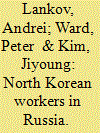

|
|
|
|
|
| Summary/Abstract |
In recent years, North Korean workers overseas have begun to attract increasing attention of the international media, human rights activists, and academics. They are often depicted as being "modern-day slaves," but the present article challenges this approach. It relies on a number of sources, including interviews with former workers (currently residing outside North Korea) and their Russian employers. In many regards, overseas North Korean workers face problematic circumstances. Nonetheless, workers compete for the opportunity to go overseas, since the overseas work, in spite of all hardships, is much preferable to all jobs they can realistically have at home. Rather than seeing themselves as victims, more or less all our interviewees perceive themselves as active and entrepreneurial individuals who succeeded in securing work that, in spite of hard conditions, opens avenues for upward social mobility. They faced constraints and difficulties, of which they are all too aware, but also had agency to act within these constraints. We offer a critical examination of the "forced labor" claim and the applicability of the International Labour Organization's Forced Labour Convention to the issue.
|
|
|
|
|
|
|
|
|
|
|
|
|
|
|
|
| 14 |
ID:
181690


|
|
|
|
|
| Summary/Abstract |
The denuclearisation of North Korea is unlikely. Neither pressure nor rewards will persuade North Korean decision-makers to surrender their nuclear weapons because they have good reasons to see denuclearisation as tantamount to collective suicide. Therefore, the only realistic goal of the United States and the international community is arms control. There are ways to reward North Korean leaders for their willingness to restrict their nuclear and missile programmes. These include partial removal of sanctions, economic assistance and subsidised investment. However, any deal will be costly, since North Korea will exact maximum compensation for its willingness to accept an arms-control regime. Reaching an agreement also will be time consuming. A grand bargain is unattainable, and the parties will have to take small, incremental steps.
|
|
|
|
|
|
|
|
|
|
|
|
|
|
|
|
| 15 |
ID:
080847


|
|
|
|
|
| Publication |
2008.
|
| Summary/Abstract |
Despite international calls for reform, the North Korean government is doing its best to maintain the domestic status quo -- and with good reason, at least from its perspective. Still, change is coming in very slow motion thanks to international aid and illegal exchanges with the outside world, which are eroding Pyongyang's legitimacy
|
|
|
|
|
|
|
|
|
|
|
|
|
|
|
|
| 16 |
ID:
119051
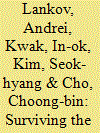

|
|
|
|
|
| Publication |
2013.
|
| Summary/Abstract |
The article deals with the everyday survival strategies employed by the workers of (largely non-functioning) state enterprises in post-socialist North Korea, and with the social changes this group has dealt with in the last two decades. It also compares these trends with the experiences of post-socialist Eastern Europe. In the 1990s the economic role of the North Korean state decreased dramatically. Official wages could no longer guarantee the physical survival of the populace, so workers from state industries engaged in a multitude of economic activities which were (and still are) largely related to the booming "second economy." These activities include private farming, employment in semi-legal and illegal private workshops, trade and smuggling, as well as small-scale business activities. The choice of a particular activity depends on a number of factors, of which network capital is especially significant. Income is also augmented by the illegal use of state resources and widespread theft of material and spare parts from state-owned factories. As a result of these changes, the industrial working class of North Korea, once a remarkably homogenous group, has fragmented, and its members have embarked on vastly different social trajectories.
|
|
|
|
|
|
|
|
|
|
|
|
|
|
|
|
| 17 |
ID:
108529


|
|
|
|
|
| Publication |
2011.
|
| Summary/Abstract |
The article argues that North Korean society is designed in a way which makes it
quite immune to pressure and incentives which originate externally. The only
force which in the long run has the capacity to place the North Korean leaders
under sufficient pressure is the North Korean people (and the Cold War experience
demonstrated that such pressure might be decisive). Due to the peculiar situation
of the divided nation and the exceptional success of the South, the North Korean
regime is especially vulnerable to the spread of truthful and uncensored information
about the outside world. So, a low-profile, determined and prolonged information
dissemination campaign is necessary. The North Korean populace should be made
aware of the prosperity of South Korea. The nationalist pretensions of the Kim
regime should be rebuffed. The North Koreans should also be frankly informed
of the less attractive features of the modern world as well. While radio broadcasts
remain the major media for delivering the message, the spread of new digital
technologies creates new opportunities which should be seriously exploited as
well, including video documentaries and electronic books.
|
|
|
|
|
|
|
|
|
|
|
|
|
|
|
|
| 18 |
ID:
145403


|
|
|
|
|
| Summary/Abstract |
This article deals with the impact on the North Korean domestic situation produced by the 1989 visit to Pyongyang by Yim Su-gyong, a young student activist from South Korea. Going there in defiance of South Korea's official policy, she was enthusiastically welcomed by the North Korean authorities, who strove to present her as an embodiment of the alleged revolutionary spirit of South Korean youngsters. However, in the long run Yim's trip produced totally different results. The North Korean audience, fascinated with Yim Su-gyong and quite attentive to her behavior, was able to read hints that indicated the official picture of South Korean life as presented by the North Korean media was wrong. Contrary to the authorities' initial expectations, the trip made North Koreans more skeptical of the officially approved worldview.
|
|
|
|
|
|
|
|
|
|
|
|
|
|
|
|
| 19 |
ID:
091864


|
|
|
|
|
| Publication |
2009.
|
| Summary/Abstract |
It is often argued that the North Korean regime, if faced with the right combination of pressure and concessions, will surrender its nuclear program. This article is critical of this viewpoint. Pyongyang's decision to go nuclear reflects long-term strategic concerns, and no amount of aid and payments will compensate for the loss of strategic advantages created by the possession of a nuclear capability. At the same time, the outside world does not have sufficiently powerful leverage at its disposal as well. Hence, a prolonged stalemate should be expected.
|
|
|
|
|
|
|
|
|
|
|
|
|
|
|
|
|
|
|
|
|